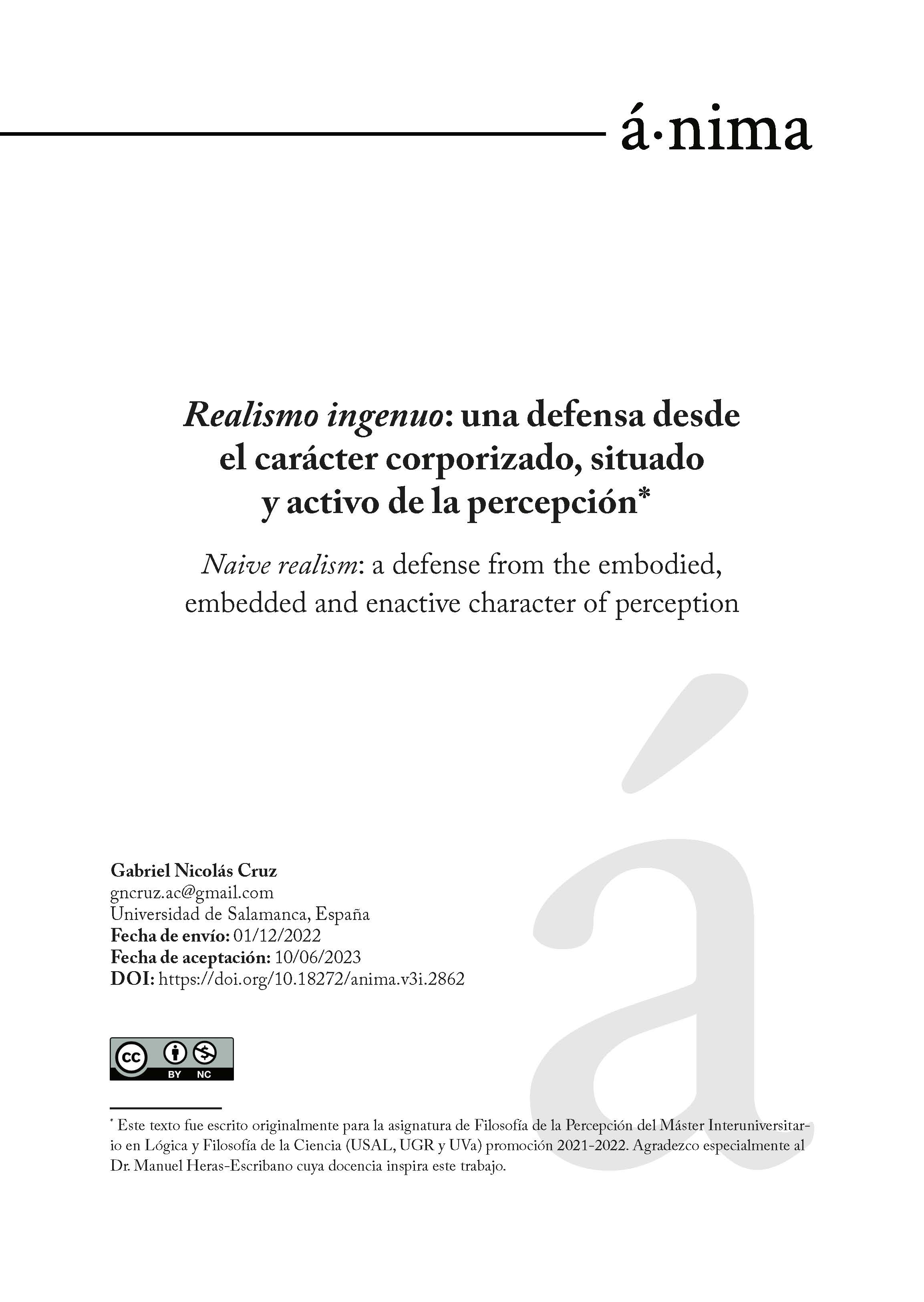Naive realism
A defense from the embodied, embedded and enactive character of perception
DOI:
https://doi.org/10.18272/anima.v3i.2862Keywords:
Philosophy of Perception, naive realism, embodied, embedded, enactiveAbstract
This paper elaborates a defense of naive realism as a theory of perception. The starting point is to demonstrate that abandoning this position and opting for alternative theories is due to admitting the existence of an indissoluble gap between the contents of perception and the way things are in the world. With this in mind, it is argued that the plausibility of such a gap has as presuppositions: a) A world and a mind ontologically independent of each other; b) The passive character of perception; and c) The existence of an essence or noumenic character of objects. Subsequently, it is shown that by replacing presuppositions a) and b) by an embodied, situated, and active approach to perception; such a gap loses plausibility. Finally, presupposition c) is attacked to complete the defense of naive realism, and the peculiarity of the realism accepted here is explained, in that it does not admit pure points of view or knowledge of essences, but is based on the very limited character of human knowledge.
Downloads
References
Brandom, Robert. Articulating Reasons. Harvard University Press, 2000.
Carnap, Rudolf. The logical structure of the World and pseudoproblems in philosophy. Open Court, 2003.
Chisholm, Roderick. Perceiving: A Philosophical Study. Cornell University Press, 1957.
De Pinedo, Manuel. "¡No es un algo, pero tampoco es una nada! Mente y Normatividad." Análisis. Revista de investigación filosófica no. 1, 2014, pp. 121-160: dialnet.unirioja.es/servlet/articulo?codigo=4885349
Descartes, Rene. Meditaciones metafísicas con objeciones y respuestas. Alafaguara S.A, 1977.
Dewey, John. Logic: The theory of Inquiry. Rinehart & Winston , 1938.
Ducasse, Curt John. “Moore's Refutation of Idealism.” Schillp, P. The philosophy of G. E. Moore. Northwestern University Press, 1942, pp. 223-252.
Gadamer, Hans-Georg. Verdad y Método II. Suígueme, 1998.
Heidegger, Martin. Ser y Tiempo. Trotta, 2012.
Heras-Escribano, Manuel. “Pragmatism, enactivism and ecologial psychology: towards a unified approach to post-cognitivism.” Synthese, 2021, pp. S337-S363: link.springer.com/article/10.1007/s11229-019-02111-1
Kiverstein, Julian. “What is Heideggerian Cognitive Science?” Kiversteim, Julian. Heidegger and Cognitive Science. Palgrave McMillan, 2012, pp. 1-61.
Russell, Bertrand. Logic and Knowledge. George Allen & Unwin, 1956.
Ryle, Gilbert. The Concept of Mind. Routledge, 1949.
Sellars, Wilfrid. “Empiricism and the Philosophy of Mind.” Sellars, Wilfrid. Science, Perception and Reality. Routledge and Keagan Paul, 1963, pp. 1-40.
Vessey, David. “Davidson, Gadamer, Incommensurability and the Third Dogma of Empiricism.” Malpas, Jeff. Dialogues with Davidson: Acting, Interpreting, Understanding. The MIT Press, 2011, pp. 241-258.

Downloads
Published
How to Cite
Issue
Section
License
Copyright (c) 2023 Gabriel Nicolás Cruz

This work is licensed under a Creative Commons Attribution-NonCommercial 4.0 International License.
Los autores que publiquen en la revista aceptan los siguientes términos:
- Los autores conservarán sus derechos de autor y garantizarán a la revista el derecho de primera publicación de su obra, la cual estará simultáneamente sujeto a la Licencia de reconocimiento de Creative Commons que permite a terceros compartir la obra siempre que se indique su autor y su primera publicación esta revista.
- Los autores podrán adoptar otros acuerdos de licencia no exclusiva de distribución de la versión de la obra publicada, pudiendo de esa forma publicarla en un volumen monográfico o reproducirla de otras formas, siempre que se indique la publicación inicial en esta revista.
- Se permite y se recomienda a los autores difundir su obra a través de Internet:
- Antes del envío a la revista, los autores pueden depositar el manuscrito en archivos/repositorios de pre-publicaciones (preprint servers/repositories), incluyendo arXiv, bioRxiv, figshare, PeerJ Preprints, SSRN, entre otros, lo cual puede producir intercambios interesantes y aumentar las citas de la obra publicada (Véase El efecto del acceso abierto).
- Después del envío, se recomiendo que los autores depositen su artículo en su repositorio institucional, página web personal, o red social científica (como Zenodo, ResearchGate o Academia.edu).





